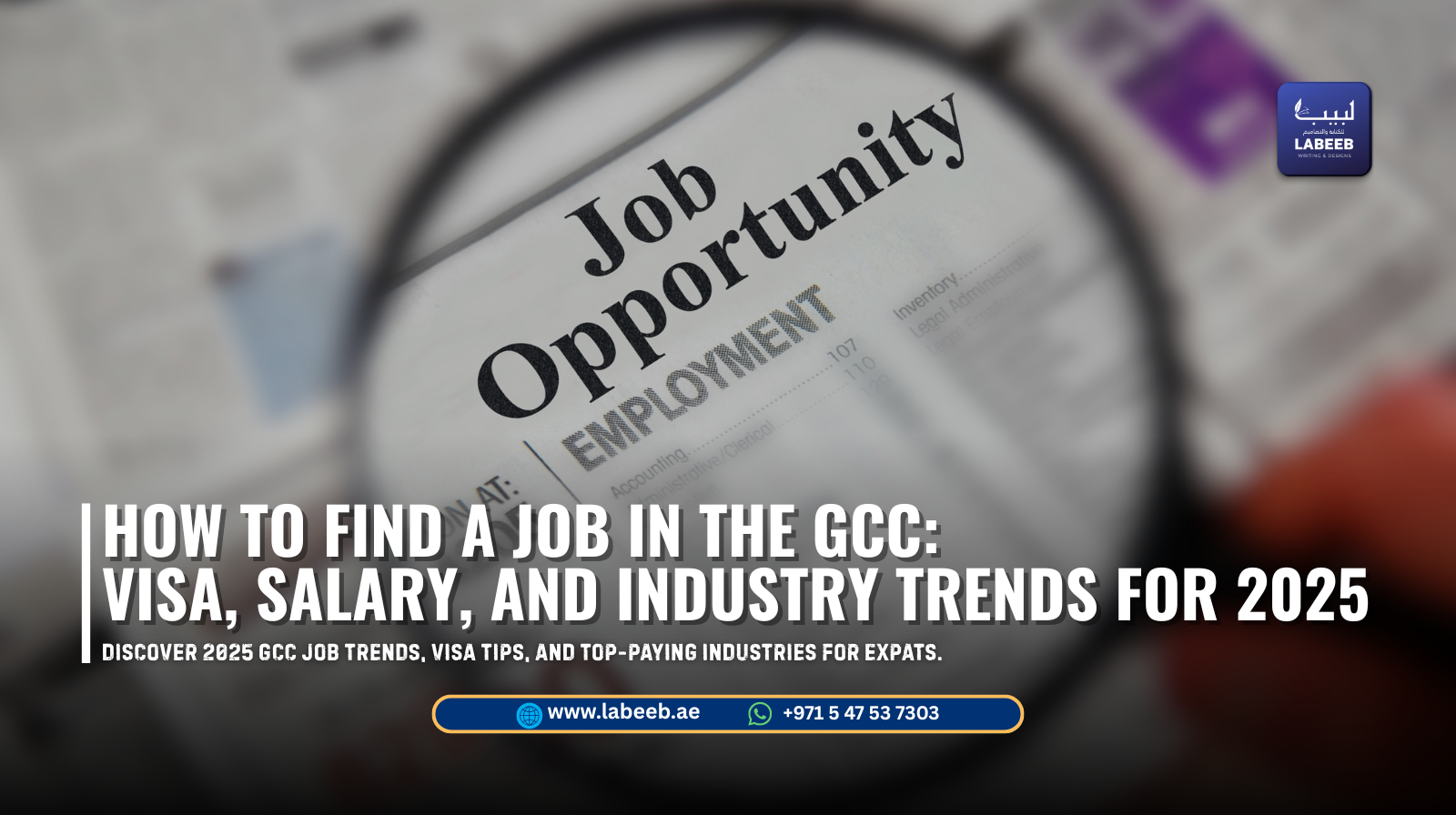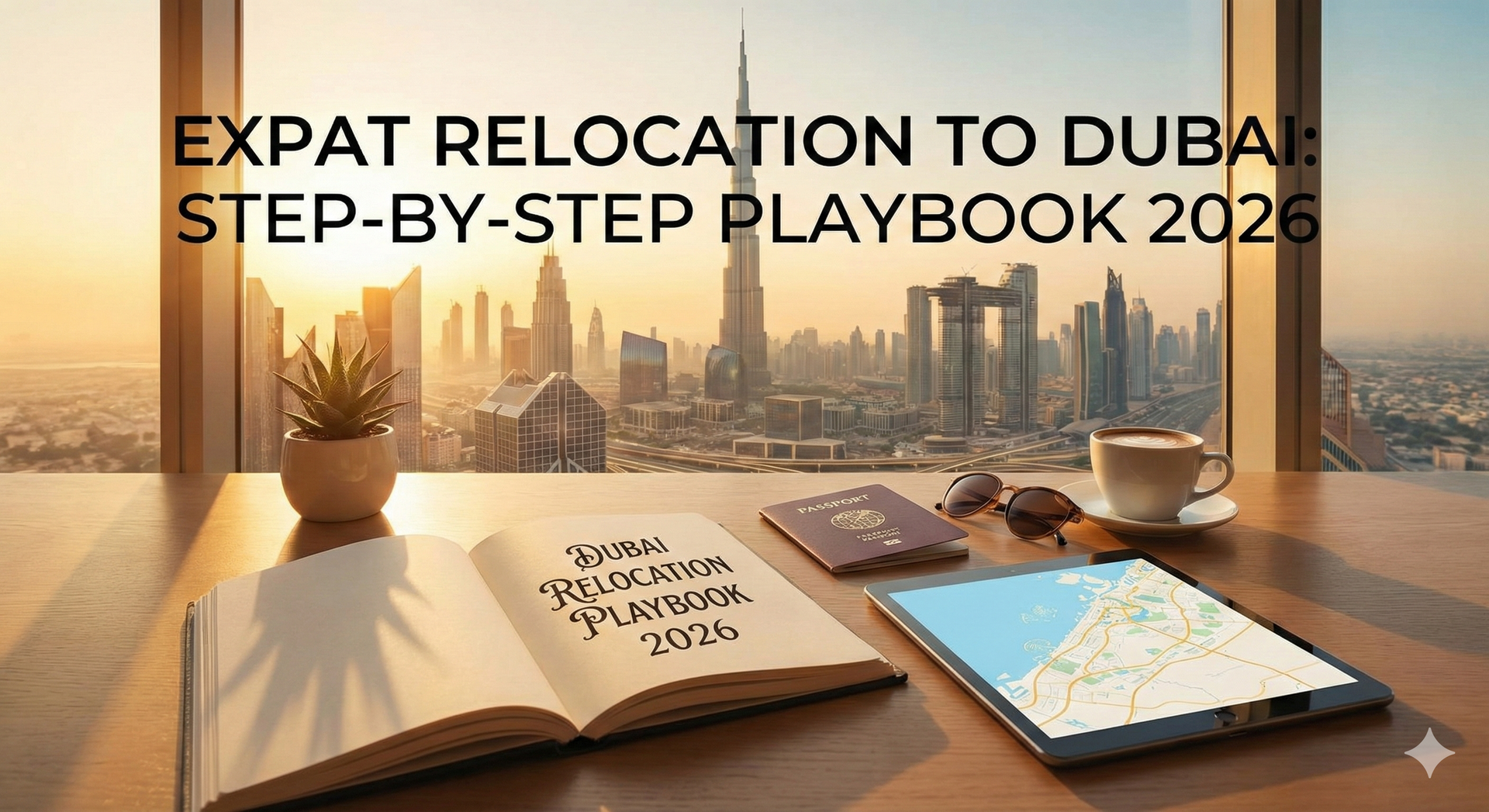How to Find a Job in the GCC: Visa, Salary & Industry Trends (2025 Guide)

Searching for a job across the Gulf Cooperation Council (GCC) countries can feel like navigating a labyrinth — especially when you’re dealing with visa rules, highly competitive sectors, and fluctuating salary standards. But with the right approach, you can turn uncertainty into opportunity. In this comprehensive guide, you will learn how to:
- understand visa sponsorship and work permit nuances across GCC nations,
- benchmark salary expectations by role and country,
- identify in-demand sectors and job portals to use,
- optimize your job search strategy for 2025’s market.
This blog is ideal for professionals, fresh graduates, and mid-career job seekers ready to land roles in the UAE, Saudi Arabia, Qatar, Oman, Bahrain, and Kuwait.
1. Overview of the GCC Job Market in 2025
1.1 Economic & Hiring Trends
- The GCC region is actively diversifying away from oil dependence—with growth in technology, renewable energy, financial services, health care, logistics, and tourism.
- According to the Barclay Simpson 2025 Salary & Recruitment Trends guide, hiring momentum is strongest in the UAE and Saudi Arabia, while Qatar, Oman, Bahrain, and Kuwait are seeing slower but sustained demand. Barclay Simpson Associates
- Salary inflation is expected to be moderate; for example, in the UAE, many companies plan ~4% raises in 2025 across industries. GRG
- The Hays GCC Salary Guide shows pay ranges for hundreds of roles and highlights which skill sets are in demand. Hays UAE+1
- Be aware: recruitment timelines in GCC can be slower than expected, with multi-stage interviews and bureaucratic delays. Barclay Simpson Associates+1
1.2 Why the GCC Remains Attractive
- Tax advantages: Many GCC countries offer tax-free salaries (or low tax regimes).
- Expat community & infrastructure: Strong support systems exist in urban hubs like Dubai, Riyadh, Doha, Muscat.
- Large state & infrastructure projects: Mega-projects under Saudi Vision 2030, UAE’s infrastructure push, Qatar’s post-World Cup investments.
- Talent demand in specialized skills: There is premium for niche skills in AI, cybersecurity, ESG, clean energy, smart cities.
2. Visa & Work Permit Essentials Across GCC
2.1 Work Visas & Sponsorship
Every GCC country mandates that expatriates work under a sponsored visa or employment permit:
- Saudi Arabia: You need Iqama (residency permit) sponsored by employer.
- UAE: Work visa is tied to employer (or free zone company).
- Qatar, Oman, Bahrain, Kuwait: Similar systems—the employer usually sponsors the visa, pays local fees, and ensures you meet local health, credential and legal checks.
During negotiations, always clarify whether your role “includes visa sponsorship.”
This is especially important for roles like project manager oil and gas jobs in Qatar for expats or hotel management jobs in Bahrain with visa sponsorship, where the package often includes visa support.
2.2 Transfers, Family Visas & Renewals
- Iqama transfer in Saudi Arabia is a process where you shift your visa sponsorship from one employer to another.
- Family visa sponsorship variations: Some employers sponsor your dependents; some don’t—double-check before signing the contract.
- Renewals: Visas typically last 1–3 years and must be renewed by the employer before expiration.
2.3 Job-Seeker Visas & Legal Entry
- The UAE offers job-seeker visas (60, 90 or 120 days) allowing foreigners to enter and search for roles legally. UAE Government Portal
- Always ensure your degree or certificates are attested for the target GCC country (often by embassy, Ministry of Foreign Affairs, and local equivalency bodies).
3. Salary Benchmarks & Compensation Packages
3.1 Salary Ranges & Trends
- The MaxHR GCC Salary Guide 2025 provides current benchmarks for roles across UAE, KSA, Qatar, Oman, Kuwait, and Bahrain. Max
- In the UAE and Saudi Arabia, Michael Page’s 2025 Salary Guide breaks down pay scales by function and experience. Michael Page
- Salary hikes in 2025 are often in the 2–4% range depending on industry. GRG
- In sectors like tech, AI, fintech, energy, you can expect higher premium, especially with in-demand certifications.
3.2 Benefits Beyond Salary
Ensure you negotiate for:
- Housing / accommodation allowance (or company-provided housing)
- Transport / car allowance
- Medical insurance & family coverage
- Annual leave, air tickets, relocation support
- End-of-service gratuity / severance pay
- Bonus / performance incentives
These often make up 20–30% of total compensation in GCC offers.
4. Best Job Portals & Platforms for GCC Careers
4.1 Leading Regional Job Platforms
- GulfTalent — particularly strong for mid to senior professionals across GCC. GulfTalent+1
- Bayt.com — a widely used portal across the MENA region, often the first stop for general roles. Wikipedia+2Bayt.com+2
- NaukriGulf, Dubizzle, Mihnati, KooJob, OmanJobs, etc. (as per your earlier list)
4.2 Niche & Free Portals
- The GCC Jobs: A free portal targeting roles across GCC—even with visa support. The GCC JOBS+1
- GCC Workforce (job seekers section) – highlights roles in construction, industrial projects, and their visa support process. GCC Workforce
- GCC Careers Group – HR and staffing service provider across the region. GCC Careers Group+1
4.3 Government Portals & Public Sector Jobs
When targeting government or public roles:
- UAE: Federal and Emirate-level government job portals, Dubai Careers, etc. UAE Government Portal
- Saudi Arabia: Musaned, Masar / Jadarah systems
- Qatar, Oman, Bahrain, Kuwait: Each ministry or civil service commission often publishes official vacancies
- See Bayt’s guide to applying for government jobs across GCC. Bayt.com
4.4 How to Use Portals Effectively
- Always set job alerts—keywords + location filters
- Use “visa sponsorship” or “expat friendly” as a filter when possible
- Keep CVs and profiles up to date
- Apply quickly—competitive roles within GCC often get filled within days
5. Crafting Your GCC-Optimized Job Search Strategy
5.1 Perfect Your CV & LinkedIn Profile
- Use relevant keywords found in job descriptions (e.g., “project manager oil and gas Qatar”, “civil engineer Kuwait”)
- Keep the format clean, bullet-based, with measurable achievements
- Reflect your regional exposure or cultural adaptability (if any)
- Ensure your LinkedIn matches your CV (recruiters in GCC often cross-check)
5.2 Networking & Referrals
- In GCC markets, many roles are filled via referrals before posted publicly
- Connect with HR professionals and hiring managers in GCC via LinkedIn
- Join GCC industry groups and expat communities
- Attend job fairs and sector conferences
5.3 Applying Smartly
- Always tailor cover letters — mention location, visa needs, why GCC
- Follow up applications appropriately — after 7–10 days
- For senior roles, go via executive recruiters in the GCC
- Be prepared for remote or video interviews
5.4 Interview Prep for GCC Roles
- Understand cultural norms and business etiquette in the country you're applying to
- Be ready to discuss compensation, visa, relocation in initial stages
- Show knowledge of local market, projects, and compliance
- Always ask clarifying questions: social benefits, sponsorship, termination policies
6. Country-Specific Considerations
6.1 UAE
- Job-seeker visa options exist. UAE Government Portal
- Government agencies like Dubai Careers, MOHRE, and Federal HR publish official jobs
- Popular sectors: real estate, tourism, fintech, logistics
6.2 Saudi Arabia
- Saudization policies may emphasize hiring locals—but strong demand in engineering, megaprojects
- NEOM, Red Sea projects, giga-projects are high opportunity zones
- Strong demand for senior mechanical engineers with accommodation
6.3 Qatar
- Oil & gas, energy, event infrastructure projects boost demand
- Roles like project manager oil & gas for expats are abundant
6.4 Oman, Bahrain, Kuwait
- Slower growth but niche demand in hospitality, infrastructure, and financial sectors
- Visa policies may be more restrictive; use local portals (e.g. OmanJobs)
7. Real Keyword-Centered Use Cases
Let’s see how your 50 long-tail keywords map into this strategy:
- “entry-level marketing jobs in Dubai for fresh graduates” → Use in blog #2 (coming soon)
- “senior mechanical engineer jobs in Riyadh with accommodation”, “civil engineer vacancies in Kuwait for Indian nationals” → Focus in engineering category
- “project manager oil and gas jobs in Qatar for expats” → Showcase in industry segment
- Keywords involving visa and benefits: “UAE work visa requirements for a UK citizen”, “how to transfer iqama sponsorship in Saudi Arabia”
- Salary & compensation: “average salary for a software developer in Riyadh”, “how to negotiate a salary package in Saudi Arabia”, “end-of-service gratuity calculation in the UAE”
- Career strategy: “how to write a CV for the Middle East job market”, “how to use LinkedIn to find a job in the GCC”, “working culture and business etiquette in the UAE”
We will tackle more of those in future posts, but this foundational guide sets the scene for all of them.
8. Tips & Warnings for GCC Job Seekers
- Beware of scams: Never pay any recruiter or agency. Real jobs in the UAE, Saudi, etc. will never require you to pay for placement.
- Validate companies: Research firm credibility, check corporate websites and LinkedIn presence.
- Language & culture matters: Knowing Arabic (or basic phrases) is often a plus in public sector or local firms.
- Don’t overcommit too early: Ask for contract in writing, be clear about sponsor responsibilities.
- Multiple applications: Don’t put all eggs in one basket. Apply in 3–4 countries with similar regulations.
9. How Labeeb.ae Can Help
At Labeeb.ae, we offer dedicated services to help GCC job seekers:
- ATS-optimized resume and CV writing → internal link: www.labeeb.ae/ats-optimized-resume-writing-services
- Cover letter & application writing → internal link: www.labeeb.ae/cover-letter-writing-services
- LinkedIn optimization & personal branding → internal link: www.labeeb.ae/linkedin-profile-optimization
- Interview coaching & follow-up strategies → internal link: www.labeeb.ae/interview-preparation
- Country-specific career guidance (UAE, KSA, Qatar, etc.) → internal link: www.labeeb.ae/career
Our team ensures your application is GCC-ready, your profile stands out, and your approach is aligned with local norms.
10. Conclusion & Next Steps
Finding a job in the GCC requires patience, strategy, and region-specific knowledge. With the right visa awareness, salary expectations, job portal mastery, and application tactics, you can position yourself as a strong candidate in the Gulf’s competitive market.
Next steps for you:
- Choose 2–3 GCC countries you’d like to target first (based on your field, visa comfort, salary expectations).
- Research job portals and create accounts for each.
- Tailor your CV & LinkedIn to match GCC preferences.
- Start applying, track results, follow up.
- Move on to our next blog in this series — e.g. “Entry-Level Marketing Jobs in Dubai for Fresh Graduates” — for more niche tactics.
Arabic Summary (خلاصة بالعربية):
هذا الدليل الشامل يرشد الباحثين عن وظائف إلى كيفية إيجاد فرصة في دول الخليج (UAE، السعودية، قطر، عمان، البحرين، الكويت) لعام 2025. ستتعلم فيه عن تأشيرات العمل، السلم الروتبي المتوقع، القطاعات الأكثر طلبًا، المنصات الوظيفية، ونصائح كتابة السيرة الذاتية واستخدام لينكدإن. كما تتضمن توجيهات حسب كل دولة وكيف يمكن لـ
Labeeb.ae مساعدتك في كل خطوة.







